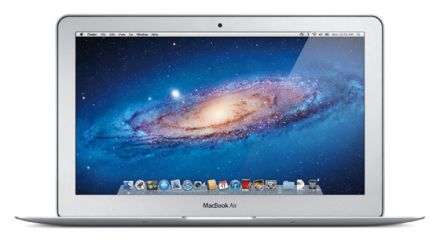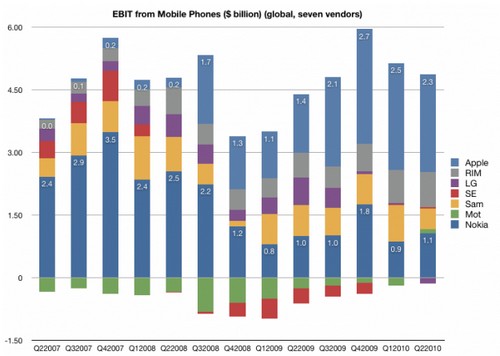Can nobody rid of us the barefoot CEO? He may be gone, but Steve Jobs continues to manipulate the press from the beyond – this time through his biographer, Walter Isaacson. The Steve Jobs biography launches the hype for Apple’s next great product, a TV.
apple
Steve Jobs and Dianamania revisited
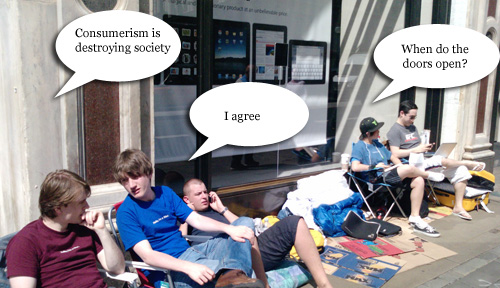
Steve Jobs was a remarkable and fascinating businessman, and by some distance the most interesting and accomplished personality operating in an important corner of the economy. He had a respect for the intelligence of human beings and their ambition, and potential – showing an optimism which is rare in a cynical industry. And Jobs left us far too early.
But we knew what was coming, didn’t we? In the media, a race to the top of Mount Hyperbole, that was easily won by Stephen Fry, with President Obama close behind. And public, showy and stagey displays of public emotion. (Why? Did no one tell you he was ill?).
I actually find all this disrespectful, and as distasteful as any sick joke.
Nobody could be more scathing about mindless technology worship than Steve Jobs. My favourite interview with him was by Gary Wolf, when Jobs was 39, and had realised the utopianism of his generation was shallow, empty and a giant diversion. The web would augment the world, not change it. Far more important, he stressed, was education.
A week with the new MacBook Air 11″
Very impressive. Shame about OS X Lion, though. Read the full review here.
The Cube: Apple’s daftest, strangest romance
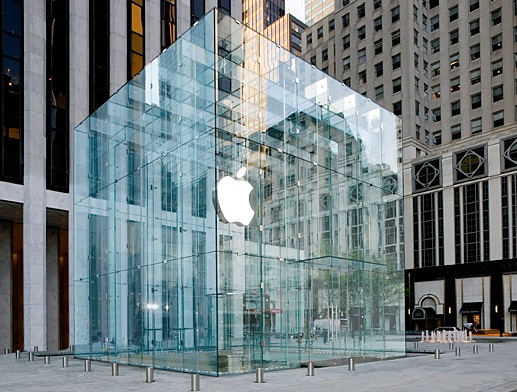 Ten years ago on Sunday, Apple called it quits on one of its oddest products ever, the G4 Cube. The Cube was a strange and wonderful machine that continues to fascinate today – but it was widely perceived to have failed. Some people thoroughly enjoyed the failure, thinking it served Apple right.
Ten years ago on Sunday, Apple called it quits on one of its oddest products ever, the G4 Cube. The Cube was a strange and wonderful machine that continues to fascinate today – but it was widely perceived to have failed. Some people thoroughly enjoyed the failure, thinking it served Apple right.
Dull people will always cheer a bold experiment that goes wrong. After July 2001, Apple’s design team never again attempted anything as daring or distinctive. It has produced beautiful designs, and unarguably influenced consumer technology design more than any one else.
But essentially, its computer designs are variations on the same theme. The professional laptops have continued in their rectangular, razor-like way. Even the iPad looks very much like how you’d expect a media slate to look like, for example.
But the Cube was different. The Cube looked like Buckminster Fuller talked; the Cube looked like it might have fallen to earth from an advanced civilisation, eager to escape orbit and looking to throw some ballast overboard. Or like a millionaire had given a mad bloke on a bus an unlimited budget.
“Hello. You look like you’ve done a lot of LSD. Well, here’s several million dollars – go and design a computer, any shape you want. Just make sure it hangs upside down.”
Why Android won’t worry RIM and Apple
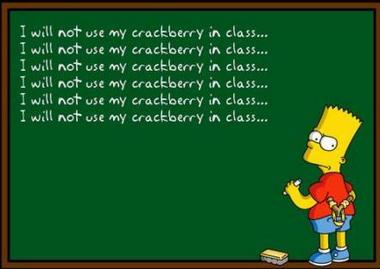 My US colleagues are regulars on John C Dvorak’s excellent Cranky Geeks and a highlight of the show. I was recently intrigued to hear the opinion from Vulture West Coast (in Episode 232) that RIM was toast, and Android would triumph. Now, bearing in mind that I’ve been wrong about mobile more than I’ve been wrong about anything else – quite epically and unheroically wrong – I beg to differ.
My US colleagues are regulars on John C Dvorak’s excellent Cranky Geeks and a highlight of the show. I was recently intrigued to hear the opinion from Vulture West Coast (in Episode 232) that RIM was toast, and Android would triumph. Now, bearing in mind that I’ve been wrong about mobile more than I’ve been wrong about anything else – quite epically and unheroically wrong – I beg to differ.
Apple will continue to rule the roost, dictating terms and charging eye-watering prices to punters. The punters will continue to be delighted with Apple, and will clamour for more; while BlackBerry has an ace up its sleeve – probably the biggest mobile sensation of the year.
When the crystal ball lies
But first things first. It’s sometimes useful to revisit why you’ve been wrong, because it can tell you a lot about the future.
Mobile phones: where does the money go?
One of the oldest mottos at Vulture Central is Show Us The Money. There’s one even better, I think, which is Show Us The Profits. Are there any? If there are, where are they going? At a stroke, this cuts through huge amounts of hype and puts entire industries (and, for good measure, almost anything WiReD magazine has ever endorsed) in a much clearer perspective. So have a gander at the following analysis of the mobile phone business – it’s quite startling.
Asymco is a one-man analyst company operated by Horace Dediu, a former Nokia manager in Helsinki, erudite and informative with a good eye for history. Earlier this week he looked at the profits of the largest seven manufacturers, responsible for 80 per cent of the phones sold, over the past three years. The trend indicated last year is now quite clear, with two North American companies capturing the lion’s share of the profits. In Q2 2007, Nokia pocketed 63 per cent of profits; Apple and RIM just seven per cent between them. Wind forward three years, and Apple and RIM snag 65 per cent of the profits, largely at the expense of Nokia, but helped by the collapse of Sony Ericsson and Motorola, who are a tiny shadow of their former selves.
There’s a conclusion to be drawn for Google and the Android licensees, thinks Asymco. None of the three leaders are likely to abandon their in-house platforms for Android, it’s either inferior (to iOS) or (as with BlackBerry OS, Symbian or Meego) switching simply isn’t worth it. So Android is left to target the very manufacturers who have been squeezed. And that in turn leaves them with some tricky choices to make. Android is becoming a commodity platform, so they need to differentiate themselves from the rest of the Android rabble: we’ve seen Sony Ericsson, HTC and Motorola invest heavily in their own UIs. But because Android is a commodity platform, this investment isn’t worth it.
Nokia, Apple and Sudden Extinction Events
 Every day brings fresh gloom for Nokia – and the criticisms are now so familiar I won’t elaborate on them. But I was struck by a recent observation likening Nokia’s plight now to Apple’s in the mid-1990s.
Every day brings fresh gloom for Nokia – and the criticisms are now so familiar I won’t elaborate on them. But I was struck by a recent observation likening Nokia’s plight now to Apple’s in the mid-1990s.
It seems absurd, at first – Nokia is still turning a profit in the billions, while Apple’s annual loss was in the billions of dollars. But one thing should focus minds of executives and shareholders for one reason that’s never mentioned – the Sudden Extinction Event.
A recent theory suggests that life on Earth is extinguished and starts over every 27 million years. Coincidentally, 27 million years is how long it takes the Dave TV channel to show every repeat of Top Gear without showing the same repeat twice [*].
Businesses suffer Sudden Extinction events too, and we saw one in the past 12 months right in Nokia’s backyard: the rebirth and crash of Palm. Some businesses are much more vulnerable to Sudden Extinctions than others, and I’ll explain why by using Apple’s pre-Jobs quandary to illustrate it.
For me, the iPad is just a port short
It hasn’t taken long for the iPad to be seen as a bit more than a pointless and expensive luxury lifestyle accessory. Just nine weeks – and in that time the hardware spec hasn’t changed at all.
But last week’s iPhone 4.0 preview, which isn’t due on the iPad until autumn, already makes it look much more attractive as a netbook or laptop replacement than it did on Wednesday.
I’ll admit I truly loathe netbooks. When the first models emerged at least they had their size going for them. Now they’re bigger and more expensive, but mostly dog slow.
Size and weight matters to me, and the iPad has had these advantages from the start. The disadvantages of an iPad over a laptop were many, but the lack of multitasking was the biggest. That’s been fixed now – at least well enough so most people don’t notice.
Rescuing Palm
You know you’re in trouble when your revenue is $1bn less than you’d expected for the year. But a few companies might envy being in Palm’s position. It has an excellent product it can’t sell, and in webOS an asset that wealthy rivals – Nokia, Samsung or Microsoft – would pick up in a snap.
Apple and the Gentlemen from the Networks (or, why it pays to turn up Really, Really Late)
 This week Apple threw the kitchen sink at its iPhone/Touch software stack, removing most of the most irritating nuisances at a stroke. It’s a stunning achievement.
This week Apple threw the kitchen sink at its iPhone/Touch software stack, removing most of the most irritating nuisances at a stroke. It’s a stunning achievement.
So Apple now finds itself where everyone else in the mobile handset business wanted to be 15 years ago. Large companies full of clever people devoted years of planning and expenditure to fail to get here. If the iPhone continues to flourish (see below for the many obstacles en route) – then both rival manufacturers and the networks have to tear up some long established strategies.
For the established handset competition, if Apple takes the lucrative high end, that leaves them scrambling around for gimmicks in a cutthroat market that’s increasingly low margin. For the networks, they’ll need to find devices that people actually want – or pray that Apple drops its carrier exclusivity policy and partners with any network that wants to sell its gear.
So how did someone with no track record in a notoriously difficult business find itself walking away with the laurels? What can explain this paradox?
For Apple, coming late to the phone business has actually been a huge advantage. The success of the iPhone is down not just to great engineering, but profiting from several years of desperate and outright stupid behaviour by the mobile phone networks, who set the terms for the manufacturers. The received wisdom of the industry – that you had to know the wiles of the mobile networks to succeed – turned out to be completely mistaken. And to explain this we find another paradox, which looks like this.
The mobile phone business is actually the most “customer friendly” or “customer responsive” in the world. This might seem a strange thing to say. Have a read of Brendon McLean’s splendid rant from two years ago – Why we hate the modern mobile phone, for a summary of customer unfriendly business. But it’s true.
That’s because the customer isn’t you or me, or the billion and a half other phone users in the world. Phone manufacturers have only 800 customers, of which only around 200 really matter: these are the gentlemen from the networks.

